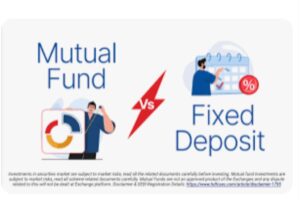How to invest in mutual funds and fixed deposits in 2024
How to invest in mutual funds. How to invest in fixed deposit. Difference between mutual fund and fixed deposit. How to invest in Mutual Fund | How to invest in fixed deposit
Friends, in this article we will know that How to invest in mutual funds. How to invest in fixed deposit. Difference between mutual fund and fixed deposit. How to invest in Mutual Funds | How to invest in fixed depositComplete information about.

How to invest in mutual funds and fixed deposits in 2024
Friends, the tax rate on mutual funds has increased from 2024, so now a simple question comes to mind whether we should put money in mutual funds or directly put money in FD (Fixed Deposit), because FD (Fixed Deposit) Interest rates have increased significantly.
In the last 1 year, in this article we are going to make a detailed comparison, we will also talk about debt mutual funds, we will also talk about equity mutual funds and also compare them with FD (Fixed Deposit). Where is more profit made? We will make comparisons on different parameters while investing money in 2024. This article will be very interesting, stay tuned.
Friends, I have made a comparison chart for you. We are going to compare FD (Fixed Deposit) and tax saving FD (Fixed Deposit). We will talk about them here. Because see, you get 5 years of login in tax saving FD (Fixed Deposit).
Here we are comparing all those investments where there is no problem of liquidity, that is, you can easily withdraw your money anytime, then together we will compare the debt oriented mutual funds, that is, where the money is less in stocks. Then we will also talk about equity oriented mutual funds where 35% of the money is invested in stocks.
Now see, these are debt oriented and equity oriented mutual funds, their different taxation becomes much more than the point of view. Now let us quickly understand how the taxation is applicable on these three products.

How to invest in mutual funds
First, if we talk about FD (Fixed Deposit), then how is the taxation on it? Whatever is your slab rate, if you are in the tax bracket of 30%, then whatever interest you have earned from FD (Fixed Deposit). He will simply be taxed at 30%, and it has always seemed that way.
There has been no such special change in 2024, but where the special change has happened, it has happened that in the case of debt oriented mutual funds, your taxation here will be directly applicable as per the IT ceiling.
If you fall in the 30% bracket, your taxation will be only 30%, that is, now the tax rate of FD (Fixed Deposit) and debt mutual fund has become the same.
But by 31st March 2024, the benefit would have been much higher. Firstly, you had to pay flat 20% tax on long term capital gains.
If you had sent it to the mutual fund after a period of more than 3 years, you would have also got indexation benefit. What it means is basically the rate which has increased due to inflation and your cost of acquisition due to big things.
Suppose you had bought a mutual fund worth Rs 1 lakh, then you would have reduced the cost sheet of acquisition to Rs 1.5 lakh and then if you had saved Rs 2 lakh after 10 years, then your actual profit which was considered at the point of future taxation is not Rs 1 lakh considered. Happened. That empty 2 lakh – 1.5 lakh for you became 1.5 lakh due to indexation benefit, so now your profit is considered to be only 50000 empty.
Your empty tax of Rs 50,000 would have been charged at 20%, that is, empty tax of Rs 10,000 would have been charged, but in this case, if we talk about today, then your direct profit is Rs 100,000. You will be taxed at 30% on it i.e. Rs 30,000 will be directly taxed. So 10000 versus 30000 is a huge difference.
Now our third one is Equity Mutual Funds. So here if you have games worth up to one lakh within a year, there is no tax on it. These games of one lakh are your total. Do you invest directly in stocks or equity oriented mutual funds? Invest in funds.
This total is not taxable on your gain up to Rs 1 lakh, but if your gain is above Rs 1 lakh then how is it taxed if you have short term capital gain i.e. your stocks or stocks which you have owned for 1 year? If you sell mutual funds, then you will be taxed at 15% on the gain on it, if it is above Rs 1 lakh.

How to invest in fixed deposit
If you save after 1 year, your tax will be 10%. If you compare this with debt mutual funds, then equity mutual funds have a lot of benefits. But here the risk becomes a little higher.
If we talk about the average return, then in FD (Fixed Deposit) you will see that the average return is 7% as of today, so the returns are very easy. On the other hand, if we talk about debt oriented mutual funds, here also you will see that online average returns are not more than 7%.
Some mutual funds which are debt mutual funds are also giving returns of 10-11% but they fall in high risk category, so obviously if your risk is too much then your returns can increase but if we look at the online average across The debt mutual funds generally do not give you returns more than 7%.
If we talk about equity oriented mutual funds, then you can expect the online average of mutual funds if we remove all the expenses. You can get returns around 11%, but how much will be your post tax return? Taxation is also very big. There is going to be an impact, so if we talk about FD (Fixed Deposit) here, if you come in the 30% bracket, then your post tax return will be around 5%. Debt oriented mutual funds also get a lot of benefit due to the first indexation benefit. go .
Now here too, your return will be only 5%, so there is no significant difference in the returns between FD (Fixed Deposit) and Debt Oriented Mutual Fund. Look at your tax in Equity Oriented Mutual Fund as well. If work is being done then 11% is too much in post tax return.
Effect: You will definitely get returns of around 10%. If we look at the average, you will get double returns on an average.
If we talk about comparison in equity mutual funds, you get almost double returns in equity mutual funds as compared to FD (fixed deposit) and debt mutual funds. If we talk about post tax return. But of course there is a little bit of risk involved, so now let us talk about risk also.
How much risk is there in mutual funds and fixed deposits?

How to invest in mutual funds and fixed deposits 2024
There is very little risk in fixed deposits because here the chances of a bank failing are very low, on the other hand if we talk about debt oriented mutual funds then there is less risk here. Look here, the money that is invested in bonds is also invested in some corporate bonds, money can be invested in some risky bonds also. When your returns are very high then we will say that you are moderate risk.
If we talk about equity oriented mutual funds, then here they come in the category of moderate to high risk, so see, here the simple thing comes that if we have to invest only money and we have to take low risk then You see, if we talk about debt oriented mutual fund versus FD (Fixed Deposit), the risk is very less here and the returns are almost equal to ours.
At 5%, FD (Fixed Deposit) starts making better sense as compared to debt mutual funds. Now here comes our last parameter, what is the time horizon and which investment is better for rising.
If we talk about FD (Fixed Deposit), then see, if you have to invest money in short term, then FD (Fixed Deposit) definitely makes much more sense. If you need some money within 1 year or 2 years, maybe you have to buy a car. Maybe after a year, if you want to buy a house after 2 years or want to finance your child’s education, then how can FD (Fixed Deposit) and debt mutual funds definitely make more sense.
So here in short term horizon you invest money in debt mutual fund or FD (Fixed Deposit) and here because the risk is high and market fluctuations can also be very high, it is possible that after 1 year you can invest in equity. If there is a decline within the mutual fund, if there is an overall decline within the stock market, then here we should always consider equity mutual funds for the long term.
And when we are talking about long term, we are talking about more than five years, so the money which you do not need for 5 years, you should put it in equity mutual fund instead of general mutual fund.
But in the short term, as we talked about earlier, debt mutual funds were quite attractive. They were there because this tax rate was earlier a tax benefit due to indexation benefit. A lot of it was available there. So now the big question comes whether most of the people will start moving into FDs (Fixed Deposits). See, in the short term I think that most of the people will start investing in FDs (Fixed Deposits).
But it is possible that now when corporates will raise money through their bonds in debt mutual funds, they may start promising higher interest rates to people because they will also have to make their investments more attractive. Now let me add one more thing here that the indexation benefit that has gone into debt mutual funds, this indexation benefit has also gone into some other mutual funds.
For example, now you will not get indexation benefit in gold mutual funds, you will not get it in hybrid mutual funds, you will not get it in fund of funds and also, this indexation benefit will not be available in mutual funds which invest money in international equities.
So now where will you invest after 2024, will you prefer FD (Fixed Deposit) or will you still invest in debt mutual funds? Do tell me in the comment section below or if you prefer equity mutual funds, that too. Tell me, if you liked this article then do like and share it with your friends and family members. Thank you
Also Read:
Payday Loans Online No Credit Check

